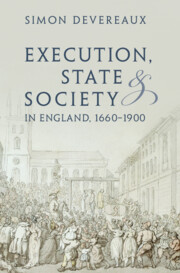
- Cited by 1
-
Cited byCrossref Citations
This Book has been cited by the following publications. This list is generated based on data provided by Crossref.
Strange, Carolyn Pascoe, Daniel and Novak, Andrew 2024. The politics of abolition: Reframing the death penalty's history in comparative perspective. Punishment & Society,
- Publisher:
- Cambridge University Press
- Online publication date:
- October 2023
- Print publication year:
- 2023
- Online ISBN:
- 9781009392129


